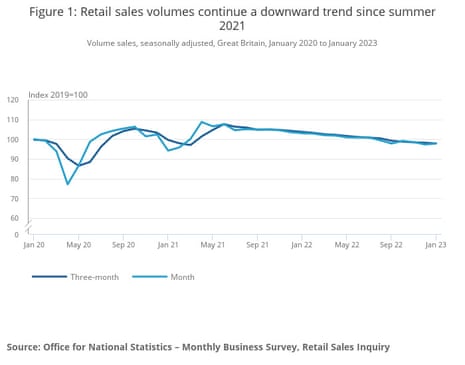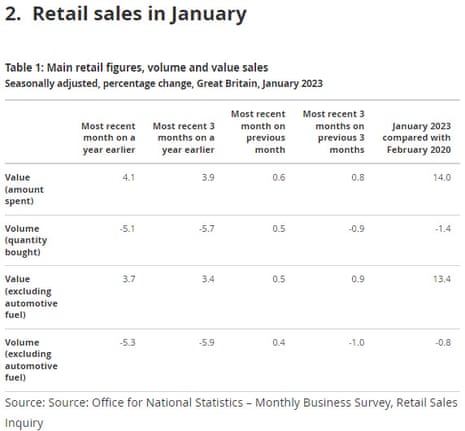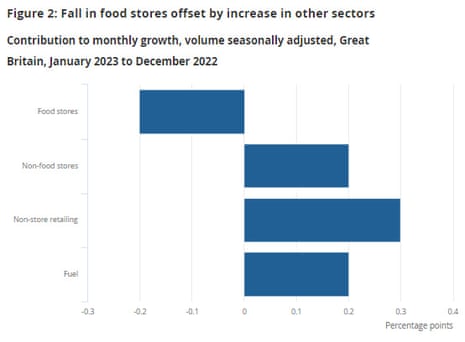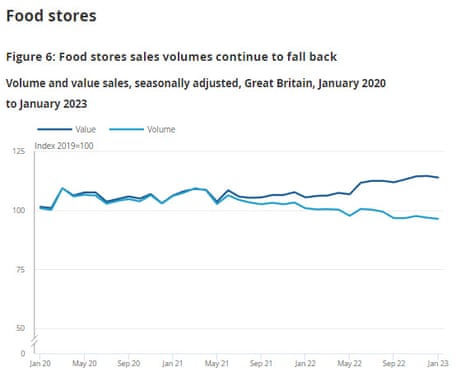Introduction: Retail sales rose in January
Good morning, and welcome to our rolling coverage of business, the financial markets and the world economy.
Retail sales across Great Britain were stronger than expected in January, as consumers kept spending despite the cost of living crisis.
But, people kept cutting back on buying food, due to the surge in costs.
The Office for National Statistics has reported this morning that retail sales volumes rose by 0.5% in January 2023, as shopping picked up after a 1.2% drop the previous month.
But on an annual basis, retail sales volumes were down by 5.7% in the three months to January 2023, as the cost of living crisis meant people could afford to buy less.

Economists had expected a 0.3% drop in retail sales volumes in January, as shoppers were hit by higher prices and surging bills, as well as concerns over the economy.
The ONS, though, reports that sales volumes at non-store retailers such as online shops jumped by 2% in January 2023, with “some feedback that January sales promotions supported the rise”.
Sales of petrol and diesel also rose in January, by 1.7%, as the recent drop on the forecourts encouraged motorists to drive more.
The ONS says:
Automotive fuel sales volumes rose by 1.7% in January 2023, following a rise of 0.3% in December 2022 as fuel prices continued to fall.
But, people bought less food last month – as food inflation hit record levels.
Food store sales volumes fell by 0.5% in January 2023 following a fall of 0.7% in December 2022.
The ONS says:
We continue to receive feedback that customers were buying less because of increased cost of living and food prices.
People also bought less clothes in January; clothing stores sales volumes fell by 2.9% in January 2023, following four months of positive growth.
Today’s data follows an unexpected drop in retail sales across Great Britain in December, when cost-conscious consumers cut back on spending in the run-up to Christmas.
Data provider GfK reported last month that UK consumer confidence dropped in January, with people more worried about the economic situation and less keen to make major purchases.
Also coming up today
The mood in the financial markets is downbeat this morning, after data yesterday showed that US producers were lifting prices faster than thought. The US producer price index, which measures wholesale goods and services prices, rose by 6% in the year to January, higher than the 5.4% expected.
Where are US interest rates heading after Jan's 'hot' jobs, retail sales, CPI & PPI reports?
Well Cleveland #fed President #Mester (non-voter) reckons rates should rise by another 0.50%.
Meaning will 5.5% now be the peak in the #Fed's next dot plot?
Not great for #equities. pic.twitter.com/NVUy8WpDkt
This suggests inflationary pressures are more stubborn than hoped, which could force the US Federal Reserve to keep interest rates high to curb price rises.
With the dollar strengthening, the pound is down half a cent at $1.194, the lowest since 6th January.
Investors will be watching events in Belfast too, where Rishi Sunak arrived last night in a sign that a deal on the Northern Ireland protocol is close.
The agenda
7am GMT: UK retail sales report for January
7am GMT: European Union new car registration figures for January
9.30am GMT: ONS releases data on “Profitability of UK Companies” and “UK trade in goods, year in review: 2022”
3pm GMT: Conference Board releases its “Leading index” on the US economy
Key events
Getting back to the latest retail sales figures, Philip Shaw of Investec says it is “notable” how high street spending has taken the strain of the cost of living crisis.
He says:
UK retail sales volumes picked up by 0.5% in January after a revised 1.2% decline in December (as covered in our introduction).
Consensus and Investec estimates had been for a 0.3% fall. Sales ex-fuel climbed by 0.4%. Food store sales slipped by 0.5% on the month, while non-food outlets saw a 0.6% increase. Within the latter category though, sales in textiles and clothing stores dropped sharply, by 2.9%. Meanwhile volumes in non-store retailing (mainly online retailers) were buoyant, recording a gain of 2.0%.
The retail sales series is notoriously volatile and especially so around the Christmas and New Year period. Accordingly we would hesitate to read too much from this specific data point. Indeed the background remains unequivocally weak. Sales volumes are now 5.1% lower than a year ago and we would note that there was only one monthly increase during the entirety of 2022.
UK fuel imports jumped 119% last year
The UK spent more than twice as much importing fuel last year than in 2021, due to the energy price shock.
New figures just released by the ONS show that the value of fuel imports increased by 119% in 2022, an increase of £63.6bn.
This was driven by the price of gas reaching record levels last year, says the ONS, adding:
High fuel prices have had a knock-on effect on the pricing of other commodities, with increased transport and production costs contributing to rising prices across most commodities.
The Russian invasion of Ukraine disrupted trade in multiple commodity types, resulting in changes to trade partners for the UK and increased import prices.
More expensive fuel helped to push up the cost of all UK imports by 32.3%, or by £155.5bn last year.
The ONS says:
Goods imports increased steadily throughout 2022, with imports from both EU and non-EU countries substantially higher.
Soros: Adani crisis will spur ‘democratic revival in India’
George Soros also suggested last night that the crisis at beleaguered conglomerate Adani Group could lead to a “democratic revival in India” – remarks that have prompted anger in New Delhi.
Speaking in Munich ahead of the Security Conference which started today, Soros cited the report from Hindenburg Research which accuses Adani Group of “brazen stock manipulation”, “accounting fraud” and “money laundering.”
Adani has denied the allegations, but has seen the value of companies in the conglomerate tumble.
Soros suggests the charges could harm India’s prime minister Narendra Modi, as business tycoon Gautam Adani is a close ally.
Soros sais:
Adani Enterprises tried to raise funds in the stock market, but he failed. Adani is accused of stock manipulation and his stock collapsed like a house of cards. Modi is silent on the subject, but he will have to answer questions from foreign investors and in parliament.
This will significantly weaken Modi’s stranglehold on India’s federal government and open the door to push for much needed institutional reforms.
I may be naïve, but I expect a democratic revival in India.
This has caused a backlash in India this morning, where cabinet minister Smriti Irani has accused Soros of interfering in the country’s electoral process.
She called on the Indian population to respond in unity to “foreign powers who try to intervene in India’s democratic processes”.
Hannah Ellis-Petersen, our South Asia correspondent, has looked at the links between Adani and Modi here:
George Soros calls for weather control to fight climate change
George Soros, the veteran philanthropist and former financier, has called for scientists to use experimental geosolar technologies to create white clouds over the Arctic, to protect it from melting.
In a speech last night, before the 2023 Munich Security Forum began, Soros warned that the melting of the Greenland ice sheet “poses a threat to the survival of our civilization”.
Soros said “human ingenuity” must be deployed to repair “a previously stable system”, before climate change reaches a tipping point.
Soros explained that he had sought advice from climate scientist Sir David King, after extremely warm weather was recorded in Greenland in July and September 2022.
“The melting of the Greenland ice sheet would increase the level of the oceans by seven meters”, Soros warned, but King – who has advised the UK government on climate – has a theory, and a plan to combat the problem.
Soros explains:
He [King] has developed a theory which is widely shared by climate scientists. It holds that the global climate system used to be stable but human intervention disrupted it. The Arctic Circle used to be sealed off from the rest of the world by winds that blew in a predictable, circular, counter-clockwise direction, but man-made climate change broke this isolation.
The circular wind used to keep cold air inside the Arctic Circle and warm air out. Now cold air leaks out from the Arctic and is replaced by warm air that’s sucked up from the south.
This explains, among other things, the Arctic blast that hit the United States last Christmas and the cold wave that hit Texas recently.
The Arctic Ocean used to be covered by pristine snow and ice that reflected the sun in what is called the “albedo effect”. But rising temperatures have caused the ice to melt and the Greenland ice sheet is no longer so pristine; it is covered by soot from last year’s forest fires on the West Coast of America, Arctic shipping and other causes.
Sir David King has a plan to repair the climate system. He wants to recreate the albedo effect by creating white clouds high above the earth. With proper scientific safeguards and in consultation with local indigenous communities, this project could help restabilize the Arctic climate system which governs the entire global climate system.
Energy giant EDF slumps to record £16bn loss
French power giant EDF has posted a record net loss of €17.9bn (£16bn) for last year, after problems at its nuclear reactors hit its output.
Nuclear output at EDF’s fleet dropped to a 34-year low in 2022, with many plants taken offline after stress corrosion cracks were found in pipes in their cooling systems.
That prevented EDF from profiting from the surge in power prices last year.
EDF, which is being nationalised by Paris, was also hit by caps on French electricity price increases as Emmanual Macron’s government protected households from rising inflation.
In the UK, EDF made an operating loss of almost £1bn for 2022 – up from a £1.7bn loss in 2021.
But on an EBITDA basis (ignoring interest, taxes, and the depreciation and writing off of asset values), EDF actually made a profit of £1.1bn, up from a £21m loss in 2021.
EDF says the UK’s cap on energy bills hit its earnings.
EDF’s energy supply business made a loss of over £200million. In short, the cost of buying the energy for our residential customers was higher than the prices we charged under the SVT cap.
FTSE falls back from record highs
Bank shares are dragging the FTSE 100 down at the start of trading.
The blue-chip share index, which hit a record high over 8,000 points yesterday, is down 46 points or 0.6% at 7966 points.
NatWest are leading the fallers, down 8.5% as traders digest this morning’s results. Lloyds Banking Group are down 4.4% too.
NatWest’s CEO, Dame Alison Rose, struck a cautious tone this morning after reporting profits almost tripled in the last quarter, saying:
Despite not yet seeing significant signs of financial distress among our customers, we are acutely aware that many people and businesses are struggling right now and that many more are worried about what the future holds.
Traders are worried that the future includes even higher interest rates, after yesterday’s hotter-than-expected US PPI inflation data (showing producers hiked their prices by 6% over the last year).
NatWest makes largest profit since financial crisis on higher rates

Kalyeena Makortoff
Bankers at NatWest will be able to splash out in the shops, after their employer ramped up its bonus pool after profits surged last year.
NatWest has increased banker bonuses after reporting its largest profit since before the 2008 financial crisis, as the lender benefited from a surge in loan and mortgage charges for its borrowers, my colleague Kalyeena Makortoff reports.
The lender – which is still 46% owned by the UK government – said profits rose 33% to £5.1bn in 2022, marking its highest pre-tax earnings since the bank almost collapsed and was forced to take a £45bn taxpayer bailout at the height of the global financial crisis.
The last time it reported a higher profit was in 2007, when profits hit £10bn.
NatWest, formerly known as Royal Bank of Scotland, increased its bonus pool for a second consecutive year as a result of the strong performance to £367.5m. That is the biggest pot shared out by its bankers since 2015 and is up from £298m last year.
Alison Rose says:
“NatWest Group delivered a strong performance in 2022.”
Here’s the full story:
January’s jump in retail spending may encourage the Bank of England to keep raising interest rates.
Neil Birrell, chief investment officer at Premier Miton Investors, explains:
“Retail sales in the UK rose last month and were much stronger than expected, contrary to the inflation data earlier in the week. There is clearly still life in the consumer, despite ongoing pressures from impending increases in council tax, amongst other things.
Those thinking that the Bank of England might start moderating policy in the short term will be disappointed by this number. Although, overall, the economic data is ambiguous, making the short and medium-term outlook really very uncertain.”
The money markets currently suggest there is a 72% chance that the BoE raises interest rates from 4% to 4.25% in March.
Despite rising 0.5% in January, UK retail sales were still 1.4% below their pre-Covid-19 levels of February 2020 levels.
But, rising inflation means people spent 14% more last month, than in February 2020, but still got less.

Aled Patchett, head of retail and consumer goods at Lloyds Bank, warns that inflation will hit the sector this year.
“Retailers will be hoping a rise in sales, though still some way below pre-covid-19 levels, signals the beginning of a recovery in consumer spending.
Yet they’re also mindful that spending habits won’t recover fully until cost-of-living pressures have subsided. In the short term, inflation could push prices up further and reduce discounts offered by retailers.
The 0.5% month-on-month rise in retail sales volumes in January suggests that the festive and New Year period “wasn’t a complete write-off for UK retailers”, says Paul Dales, chief UK economist at Capital Economics.
But he warns that the next 6-12 months will probably still be a struggle for retailers, even if 2023 is unlikely to be as bad as 2022.
Dales says there are two reasons not to get too carried away by today’s data:
First, retail sales were very weak last year but overall consumer spending held up due to stronger non-retail spending (particularly in restaurants). When households’ finances are under pressure, it possible that any improvement in retail sales will be just be met by a softening in non-retail spending.
Second, although the biggest falls in real incomes are now behind us, the full drag on activity from higher interest rates has yet to be felt. As such, it is too soon to conclude that the retail sector is coming out of its funk and that the economy won’t yet fall into a recession.
Charts: How food sales are falling as prices spiral
These charts, from today’s retail sales report, show how people across Great Britain bought less food in January:


As you can see, the jump in prices means people have had to spend more, to get less.
ONS: the general trend remains one of decline
The general trend in retail spending is downwards, warns ONS director of economic statistics Darren Morgan, despite the 0.5% rise in volumes last month.
Morgan says:
“After December’s steep fall, retail sales picked up slightly in January, although the general trend remains one of decline.
“In the latest month, as prices continue to fall at the pumps, fuel sales have risen.
“Meanwhile, discounting helped boost sales for online retailers as well as jewellers, cosmetic stores and carpet and furnishing shops.
“However, after four months of consecutive growth, clothing store sales fell back sharply.”
Introduction: Retail sales rose in January
Good morning, and welcome to our rolling coverage of business, the financial markets and the world economy.
Retail sales across Great Britain were stronger than expected in January, as consumers kept spending despite the cost of living crisis.
But, people kept cutting back on buying food, due to the surge in costs.
The Office for National Statistics has reported this morning that retail sales volumes rose by 0.5% in January 2023, as shopping picked up after a 1.2% drop the previous month.
But on an annual basis, retail sales volumes were down by 5.7% in the three months to January 2023, as the cost of living crisis meant people could afford to buy less.

Economists had expected a 0.3% drop in retail sales volumes in January, as shoppers were hit by higher prices and surging bills, as well as concerns over the economy.
The ONS, though, reports that sales volumes at non-store retailers such as online shops jumped by 2% in January 2023, with “some feedback that January sales promotions supported the rise”.
Sales of petrol and diesel also rose in January, by 1.7%, as the recent drop on the forecourts encouraged motorists to drive more.
The ONS says:
Automotive fuel sales volumes rose by 1.7% in January 2023, following a rise of 0.3% in December 2022 as fuel prices continued to fall.
But, people bought less food last month – as food inflation hit record levels.
Food store sales volumes fell by 0.5% in January 2023 following a fall of 0.7% in December 2022.
The ONS says:
We continue to receive feedback that customers were buying less because of increased cost of living and food prices.
People also bought less clothes in January; clothing stores sales volumes fell by 2.9% in January 2023, following four months of positive growth.
Today’s data follows an unexpected drop in retail sales across Great Britain in December, when cost-conscious consumers cut back on spending in the run-up to Christmas.
Data provider GfK reported last month that UK consumer confidence dropped in January, with people more worried about the economic situation and less keen to make major purchases.
Also coming up today
The mood in the financial markets is downbeat this morning, after data yesterday showed that US producers were lifting prices faster than thought. The US producer price index, which measures wholesale goods and services prices, rose by 6% in the year to January, higher than the 5.4% expected.
Where are US interest rates heading after Jan's 'hot' jobs, retail sales, CPI & PPI reports?
Well Cleveland #fed President #Mester (non-voter) reckons rates should rise by another 0.50%.
Meaning will 5.5% now be the peak in the #Fed's next dot plot?
Not great for #equities. pic.twitter.com/NVUy8WpDkt
This suggests inflationary pressures are more stubborn than hoped, which could force the US Federal Reserve to keep interest rates high to curb price rises.
With the dollar strengthening, the pound is down half a cent at $1.194, the lowest since 6th January.
Investors will be watching events in Belfast too, where Rishi Sunak arrived last night in a sign that a deal on the Northern Ireland protocol is close.
The agenda
7am GMT: UK retail sales report for January
7am GMT: European Union new car registration figures for January
9.30am GMT: ONS releases data on “Profitability of UK Companies” and “UK trade in goods, year in review: 2022”
3pm GMT: Conference Board releases its “Leading index” on the US economy

 1 year ago
94
1 year ago
94










 English (US)
English (US)